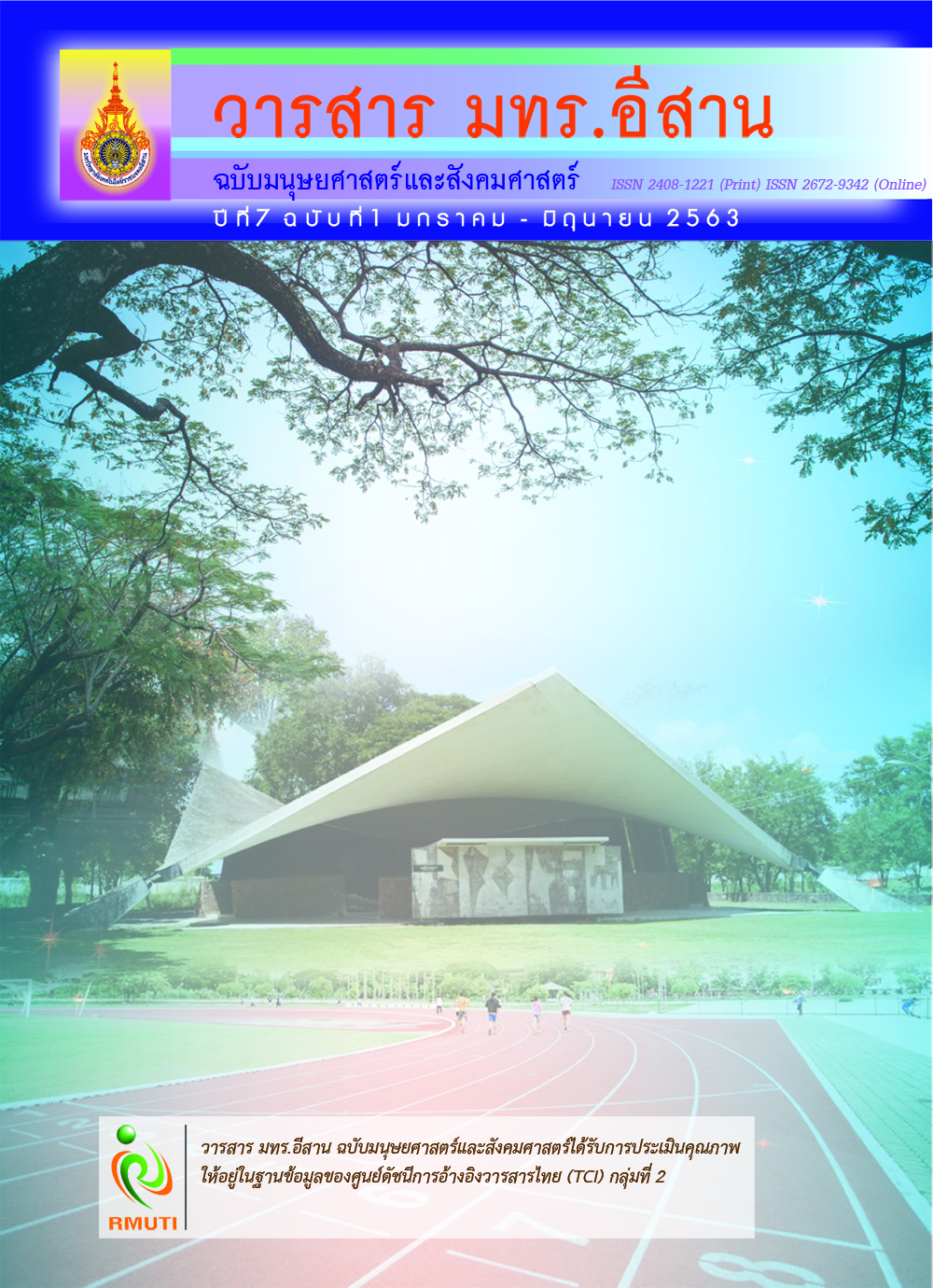The Influence of Marketing Communication by Social Media Influencer on Purchasing Decision toward Cosmetic Products for Working Consumers
Main Article Content
Abstract
The purpose of this research was to study the influence of communication marketing by social media influencer on purchasing decision toward cosmetic products of working consumers. The questionnaire was used as a tool to collect data from 400 working women who experienced in purchase brand name cosmetics in Bangkok and the Metropolitan region. Non-probability sampling as purposive sampling use for analyzing data by descriptive statistics include frequency, percentage, mean, and standard deviation-besides, the multiple regression analysis for a hypothesis test. The study found that communication marketing by social media influencer, including popularity, trust, information reliability, expertise, and presentation style influence the brand attitude of working consumers significantly at 0.01 level. Therefore, the testing mediator variable indicates that brand attitude as a mediator variable of the influence of communication marketing by social media influencer on purchasing decision toward cosmetic products of working consumers. The results of this study can be used as a guideline for cosmetic businesses to develop communication marketing channels on online social media and create branding to consumers’ acceptability, lead to creating the marketing strategies for competitive advantages.
Article Details
บทความที่ได้รับการตีพิมพ์เป็นลิขสิทธิ์ของมหาวิทยาลัยเทคโนโลยีราชมงคลอีสาน
ข้อความที่ปรากฏในบทความแต่ละเรื่องในวารสารวิชาการเล่มนี้เป็นความคิดเห็นส่วนตัวของผู้เขียนแต่ละท่านไม่เกี่ยวข้องกับมหาวิทยาลัยเทคโนโลยีราชมงคลอีสานและคณาจารย์ท่านอื่นๆในมหาวิทยาลัยฯ แต่อย่างใด ความรับผิดชอบองค์ประกอบทั้งหมดของบทความแต่ละเรื่องเป็นของผู้เขียนแต่ละท่าน หากมีความผิดพลาดใดๆ ผู้เขียนแต่ละท่านจะรับผิดชอบบทความของตนเองแต่ผู้เดียว
References
กัลยา วานิชย์บัญชา. (2553). การวิเคราะห์สถิติขั้นสูงด้วย SPSS for Windows. พิมพ์ครั้งที่ 7. กรุงเทพฯ : คณะพาณิชยศาสตร์และการบัญชี. จุฬาลงกรณ์มหาวิทยาลัย
กิติยา สุริวรรณ, พิชามน พวงสุวรรณ และอุรพี จุลิมาศาสตร์. (2559). ความสัมพันธ์ระหว่างผู้ทรงอิทธิพลทางความคิดผู้บริโภค และตราสินค้า. วารสารการสื่อสารและการจัดการ นิด้า. ปีที่ 2, ฉบับที่ 3, หน้า 79-96
จิราภรณ์ ถึงสุข และวสุธิดา นุริตมนต์. (2562). การรับรู้การสื่อสารทางการตลาดแบบบูรณาการ และการสื่อสารแบบปากต่อปากผ่านสื่ออิเล็กทรอนิกส์ส่งผลต่อความตั้งใจซื้อผลิตภัณฑ์ออร์แกนิคของผู้บริโภคในเขตกรุงเทพมหานคร. วารสารมนุษยศาสตร์และสังคมศาสตร์ มหาวิทยาลัยราชภัฏสุรินทร์. ปีที่ 21, ฉบับที่ 2, หน้า 113-129
ณัฐนิชา ทองทวี, อรรถศิษฐ์ พัฒนะศิริ, มยุรี ศรีกุลวงศ์ และอารีวรรณ สุขวิลัย. (2560). รูปแบบการนำเสนอข้อมูลผลิตภัณฑ์ของบิวตี้บล๊อกเกอร์ยอดนิยม 4 อันดับแรกของไทยบนสื่อสังคมออนไลน์. วารสารวิชาการนวัตกรรมสื่อสารสังคม. ปีที่ 5, ฉบับที่ 2, หน้า 125-132
ทิพย์รดา ปิ่นแก้ว และพัชรา เอี่ยมกิจการ สบายใจ. (2560). อิทธิพลของสื่อบุคคลกับอาหารซุปเปอร์ฟู๊ด. วารสารมทร.อีสาน ฉบับมนุษยศาสตร์และสังคมศาสตร์. ปีที่ 4, ฉบับที่ 2, หน้า 113-124
บุญใจ ศรีสถิตนรากูร. (2550). ระเบียบวิธีการวิจัย: แนวทางปฏิบัติสู่ความสำเร็จ. กรุงเทพมหานคร: โรงพิมพ์จุฬาลงกรณ์มหาวิทยาลัย
ประยูรศรี บุตรแสนคม. (2555). การคัดเลือกตัวแปรพยากรณ์เข้าในสมการถดถอยพหุคูณ. วารสารการวัดผลการศึกษา มหาวิทยาลัยมหาสารคาม. ปีที่ 17, ฉบับที่ 1, หน้า 43-60
พิสิษฐ์ พจนจารุวิทย์. (2560). กลยุทธ์การสื่อสารการตลาดแบบบูรณาการที่มีอิทธิพลต่อพฤติกรรมการตัดสินใจเข้าศึกษาต่อของนักศึกษาที่มหาวิทยาลัยราชภัฎในประเทศไทย. วารสาร สมาคมนักวิจัย. ปีที่ 22, ฉบับที่ 2, หน้า 106-118
ไพรัช วงศ์ศรีตระกูล. (2558). พฤติกรรมการซื้อสินค้าและบริการผ่านอินเทอร์เน็ตของผู้มีงานทำในจังหวัดชลบุรี. วารสาร มทร.อีสาน ฉบับมนุษยศาสตร์และสังคมศาสตร์. ปีที่ 2, ฉบับที่ 1, หน้า 94 -115
รัฐญา มหาสมุทร และวรัชญ์ ครุจิต. (2559). กลยุทธ์การสื่อสารของผู้ทรงอิทธิพลทางความคิดในโลกออนไลน์ที่มีผลต่อทัศนคติของกลุ่มผู้ติดตาม. วารสารการสื่อสารและการจัดการ นิด้า. ปีที่ 2, ฉบับที่ 1, หน้า 81-106
ศิวฤทธิ์ สุทธแสน และธัญญา สุพรประดิษฐ์ชัย. (2560). อิทธิพลการสื่อสารการตลาดมีผลต่อความตั้งใจซื้อผลิตภัณฑ์เครื่องดื่มแอลกอฮอล์ของผู้บริโภค. วารสารวิชาการบริหารธุรกิจ สมาคมสถาบันอุดมศึกษาเอกชนแห่งประเทศไทยในพระราชูปถัมภ์ สมเด็จพระเทพรัตนราชสุดาฯ สยามบรมราชกุมารี. ปีที่ 6, ฉบับที่ 1, หน้า 158-170
ศูนย์วิจัยกสิกรไทย. (2560). บทวิเคราะห์แนวโน้มธุรกิจ, ปี 60 คาดคนกรุงฯ ใช้จ่ายซื้อเครื่องสำอางลดลงแม้ภาพรวมซบเซา แต่ส่วนใหญ่ไม่ลดการใช้หันมาปรับพฤติกรรมการซื้อแทน. เข้าถึงเมื่อ (4 เมษายน 2563). เข้าถึงได้จาก (https://kasikornresearch.com/th/analysis/k-econ/business/Pages/36468.aspx)
สำนักงานพัฒนาธุรกรรมทางอิเล็กทรอนิกส์. (2563). กระทรวงดิจิทัลเพื่อเศรษฐกิจและสังคม, ETDA เผยปี 62 คนไทยใช้อินเทอร์เน็ตเพิ่มขึ้นเฉลี่ย 10 ชั่วโมง 22 นาที Gen Y ครองแชมป์ 5 ปีซ้อน. เข้าถึงเมื่อ (30 มีนาคม 2563). เข้าถึงได้จาก (https://www.etda.or.th/content/thailand-internet-user-behavior-2019-press-release.html)
Arora, A. and Sahu, K. (2014). “TEARS MODEL”: A Company Should Use for Celebrity Endorsement. International Journal of Applied Services Marketing Perspectives. Vol. 3, Number 1, pp. 687-690
Baron, R. M., and Kenny, D. A. (1986). The Moderator-Mediator Variable Distinction in Social Psychological Research: Conceptual, Strategic, and Statistical Considerations. Journal of Personality and Social Psychology. Vol. 51, No. 6, pp. 1173-1182. DOI: 10.1037//0022-3514.51.6.1173
Chen, Y., Fay, S., and Wang, Q. (2011). The Role of Marketing in Social Media: How Online Consumer Reviews Evolve. Journal of Interactive Marketing. Vol. 25, Issue 2, pp.85-94. DOI: 10.1016/j.intmar.2011.01.003
Cochran, W. G. (1977). Sampling Techniques. (3rd ed.). New York: John Wilay and Sons
Cronbach, L. J. (1951). Coefficient Alpha and the Inter Structure of Tests. Psychometrika. Vol. 16, Issue 3. pp. 297-334
David, L. L. and Albert, J. D. B. (2002). Consumer Behavior. New Delhi: McGraw Hill
East, R. (1998). Consumer Behavior Advance and Applications in Marketing. UK: Prentice-Hall
Ha, M. N. and Lam, H. N. (2016). The Effects of Celebrity Endorsement on Customer’s Attitude toward Brand and Purchase Intention. International Journal of Economics and Finance. Vol. 9, No. 1, pp. 64-77. DOI: 10.5539/ijef.v9n1p64
Hursh, S. R. (1980). Economic Concepts for the Analysis of Behavior. Journal of the Experimental Analysis of Behavior. Vol. 34, Issue 2, pp. 219-238. DOI: 10.1901/jeab.1980.34-219
Khuong, N. M. and Duyen, T. H. (2016). Personal Factors Affecting Consumer Purchase Decision Towards Men Skin Care Products-A study in Ho Chi Minh City, Vietnam. International Journal of Trade, Economics and Finance. Vol. 7, No. 2, pp. 44-50. DOI: 10.18178/ijtef.2016.7.2.497
Kotler, P. and Levy, S. J. (1969). Broadening the Concept of Marketing. Journal of Marketing. Vol. 33, No. 1, pp. 10-15. DOI: 10.2307/1248740
Kotler, P. (2003). Marketing Management. (11th ed.). New Jersey: Prentice Hall
Kotler, P. and Keller, K. L. (2016). Marketing Management. (14th ed.). New Jersey: Prentice Hall
Lutz, R. J. (1991). Perspectives in Consumer Behavior. (4th ed.). Engle Woodcliffs, NJ: Prentice-Hall
Nandagiri, V. and Philip, L. (2018). The Impact of Influencers from Instargram and YouTube on their Followers. International Journal of Multidisciplinary Research and Modern Education. Vol. 4, Issue 1, pp. 61-65
Nunnally, J. C. and Bernstein, I. H. (1994). Psychometric Theory. (3th ed). New York: McGraw-Hill
Nurittamont, W. (2017). Understanding the Role of Technology Acceptance Influence on Internet Banking Intention: An Empirical Study in Consumer of Commercial Bank. International Journal of Applied Computer Technology and Information Systems. Vol. 6, No. 2, pp. 28-33
Nurittamont, W. (2019). Enhancing E-Service Quality of Airline Industry: an Empirical Study in Customers of Low Cost Airline. International Journal of the Computer, the Internet and Management. Vol. 27, No. 1, pp. 91-95
Schiffman, L. G. and Kanuk, L. (2000). Consumer Behavior. (7th ed.). Upper Saddle River, NJ: Prentice-Hall
Shimp, T. A. (2003). Advertising, Promotion and Supplemental Aspects of Integrated Marketing Communications. Eights Edition, Mason, OH: South Western Cengage Learning
Solomon, M. R. (2013). Consumer Behavor Buyng, Havng, Being (10th). England: Pearson Education
Trivedi, J. and Sama, R. (2020). The Effect of Influencer Marketing on Consumers’ Brand Admiration and Online Purchase Intentions: An Emerging Market Perspective. Journal of Internet Commerce. Vol. 19, Issue 1, pp. 103-124. DOI: 10.1080/15332861.2019.1700741


